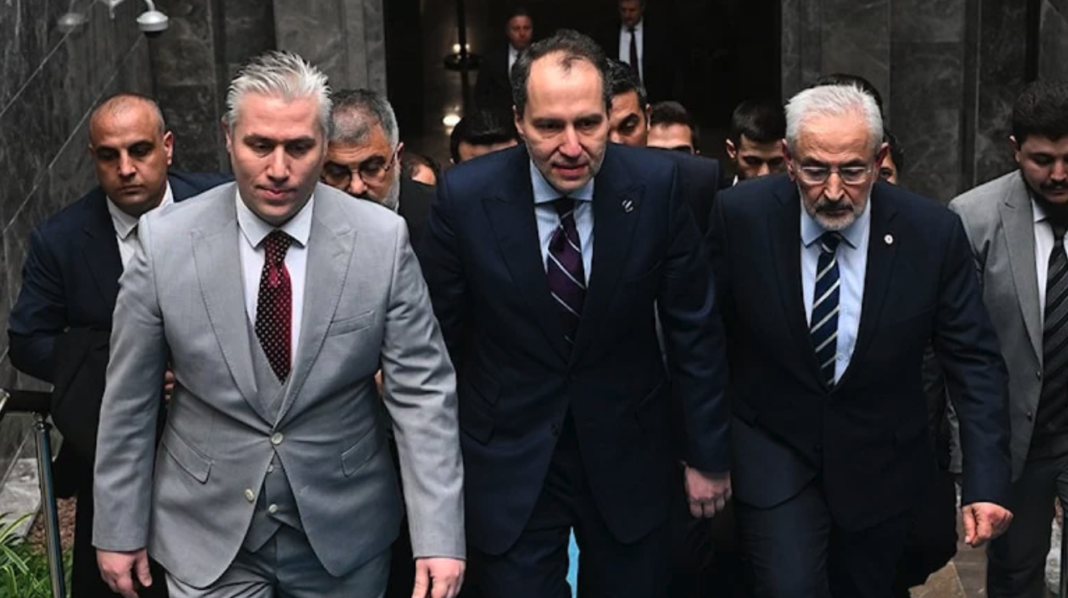The New Welfare Party and Huda-Par back the People’s Alliance led by Erdogan’s Justice and Development Party. Andrew Wilks reports in Al-Monitor on March 27, 2023.
Two Islamist parties have signed up to support Turkish President Recep Tayyip Erdogan’s electoral alliance, putting a law on violence against women under threat and challenging the wider rights of women and the LGBTQ community.
In a U-turn over the weekend, the New Welfare Party (YRP) was officially admitted into the People’s Alliance led by Erdogan’s Justice and Development Party (AKP). The alliance also includes two far-right parties.
The Free Cause Party, known as Huda-Par, announced on Friday that it would field candidates under the AKP’s list in the parliamentary election being held alongside a presidential vote on May 14.
Prior to throwing their support behind the People’s Alliance, both the YRP and Huda-Par had insisted their backing was conditional on amending Law 6284 on the prevention of violence against women and children. In a list of 30 demands, the YRP also called for the closure of LGBTQ associations.
“The memorandum of understanding, in which the principles that we demanded as the New Welfare Party are written, was signed by the [parties’] general secretaries,” YRP leader Fatih Erbakan said Friday.
Law 6284 was passed in 2012, a year after Turkey ratified the Istanbul Convention to protect women against violence. Erdogan signed a presidential decree in March 2021 to withdraw from the Council of Europe convention.
In a copy of the agreement between the AKP and YRP published by journalist Ismail Saymaz, the parties pledge to “prevent perversions against our moral values” and reevaluate existing laws to “protect the integrity of the family.”
The document also mentions alimony payments, calling for changes to “eliminate grievances in society.”
Ali Ihsan Yavuz, the AKP’s deputy chair and head of electoral affairs, told broadcaster CNN Turk on Monday that there had been “no abnormal proposal by the New Welfare Party on women’s rights. … Our president is very meticulous about this issue.”
He added, “What we have accepted is just a memorandum of understanding [on what] the New Welfare Party is sensitive to.”
The inclusion of the YRP and Huda-Par under the alliance’s umbrella came despite protests among female AKP officials.
Ozlem Zengin, deputy chair of the AKP’s parliamentary group, described Law 6284 as a “red line” while Family and Social Services Minister Derya Yanik said it was “unacceptable … that even its existence is open to discussion.” Zengin said she had received “hundreds of threatening messages” following her remarks.
Dilek Bulut of the Left Feminist Movement said the discussion of amending Law 6284 would make women more vulnerable to violence.
“In an environment where violence and discrimination against women is increasing and becoming savage every day, those who annulled the Istanbul Convention have now revealed their true faces by making Law 6284 a subject of negotiation,” she said.
Lawyer Gokcecicek Ayata, of the Women’s Platform for Equality, agreed the debate would fuel misogynist violence. “With this protocol, they encourage and incite the perpetrators of violence,” she said. “In a country where at least three women are killed every day, the People’s Alliance is opening to question the rights of women of all political views, from 7 to 70, for the sake of their own success. It’s not just 6284; they oppose the right to alimony, civil law, equality and women’s right to life.”
Ties to Huda-Par, meanwhile, brought other considerations, namely its roots in the Kurdish Hizbollah movement.
Hizbollah, which is entirely unconnected to the Shiite Lebanese group of the same name, sprang up in the 1990s from Sunni Islamist groups in Turkey’s Kurdish-majority southeast.
It became one of the groups most associated with violence of its era, waging attacks including assassinations on members of the Kurdistan Workers Party (PKK), the Turkish security forces and civilians such as secularist journalists.
Due to its opposition to the PKK, Hizbollah was widely believed to be backed by elements of the military and police.
Its influence waned after a police raid on an Istanbul safe house in 2000 in which the group’s leader was killed. The police also seized documents detailing membership and footage of torture sessions and murders, leading to hundreds of arrests.
Links to terrorism, however, were brushed aside by Erdogan’s ally Devlet Bahceli, who heads the Nationalist Movement Party.
“The Free Cause Party completely rejected terrorism and shared with our nation that it has no ties to any illegal organization,” said Bahceli, who frequently accuses the opposition of supporting the PKK. “There has never been a clear relationship between the Hizbollah terrorist organization and the Free Cause Party, and within this framework, there has been no convincing and substantiating information up to now.”
Sadettin Tantan, who served as interior minister from 1999 to 2001, insisted that Bahceli, as deputy prime minister during the same period, was “one of the names who know best that Huda-Par is the political extension of Hizbollah.”

